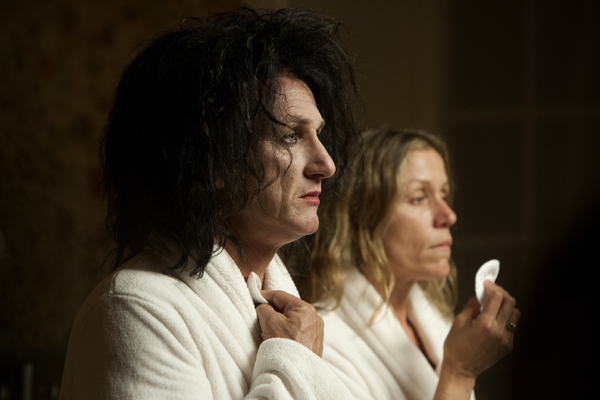
Sean Penn and Frances McDormand in THIS MUST BE THE PLACE (The Weinstein Company)
The old country comes to the New World in a magical tale with ancient roots of a prodigal son returning for revenge. Writer/directed Paolo Sorrentino’s first English-language film takes a European’s view of America, like a cinematic DeToqueville, whereas his previous film, the cynical Il Divo (2008), was steeped in Italian political history.
It opens at a castle in present-day Ireland inhabited by a rich American pop culture icon frozen in time. Cheyenne (Sean Penn) floats through his estate looking like the Cure’s Robert Smith, with full goth make-up, black leather, and a mane of dyed-black, teased hair. Contrary to his ghoulish look and debilitating depression, Penn sweetly conveys that Cheyenne is a gentle, empathetic soul as well as a sensitive and intelligent observer of the people around him. He incongruously pals around with goth 16-year-old Mary (Eve Hewson) in a shopping mall, where he mischievously matchmakes her with a brash young rocker (Simon Delaney), and tries to stand in for her missing big brother.
His beloved, longtime wife Jane is the practical one in this odd household, much like Sharon Osbourne seems with her heavy metal husband Ozzie. Jane is literally a lifesaver; she works as a firefighter at her day job and serves as a lifeline to Cheyenne on the telephone no matter his temptations. Cheerfully played by Coen brothers’ regular (and wife) Frances McDormand, she brings resonance of their absurdist humor and themes.
The phobic Cheyenne reluctantly sets out on a strange odyssey through jarring images, striking symbols, and surprising poignancy, all set in gorgeous landscapes with lots of references to classic movies. After 30 years of estrangement, Cheyenne has to go home again, to New York just in time for his father’s funeral, whose corpse is not only surrounded by Hasidic Jews but still bears a numbered tattoo from Auschwitz. (Though this scenario looks lifted from Woody Allen, it isn’t that far-fetched—several heavy rockers are children of Holocaust survivors, such as Kiss’s Gene Simmons). His inheritance is his father’s last demand—to avenge his treatment at the hands of a sadistic concentration camp guard said to be hiding out west, a mission that even the obsessed old Nazi hunter Mordecai Midler (Judd Hirsch) has failed to accomplish. Midler educates Cheyenne on what his father experienced, screening the greatest hits of Holocaust horrors, like the footage in the Judgment at Nuremberg courtroom.
While following clues in his picaresque quest across the U.S. for the criminal German immigrant, Cheyenne comes across a panoply of cameos—like David Byrne as himself (from his title song on, his music recurs in the score with new songs written in collaboration with Will Oldham, aka Bonnie Prince Billy). Harry Dean Stanton gives him advice in a Hopper-esque coffee shop, and Cheyenne tracks down an elderly history teacher (Joyce Van Patten) who has no sense of her own tainted family background. Up to Montana and down to New Mexico during the 2008 election, he drives through John Ford’s landscape, where a bison appears out of the morning mist like a primal representation of extinction and America’s own genocide before he reenacts, in his own manner, the Polish winter of 1943 on the snowy high plains.
Audiences could find the figure-out-the-symbol game and the European jabs at easy American stereotypes tiresome (including a visit to a gun store too eerily like the ones where recent mass killers bought their weapons). But I was touched by Cheyenne’s growing maturity as he contemplated how far the sins of the father should carry to the next generations. This realization finally grounds this kooky, lovely film in an optimistic glow of humanity.
















Leave A Comment